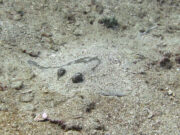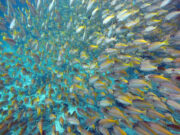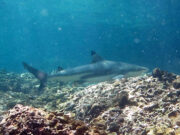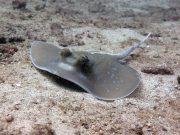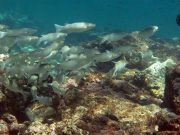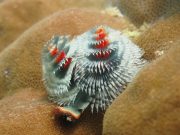Koh Bida Diving
Mu Ko Phi Phi National Park
Koh Bida Nok and Koh Bida Nai are two small islands located in the Andaman Sea, just to the south of Phi Phi. These two small islands have some of the best coral reefs and diving around Koh Phi Phi. Together with the submerged pinnacle of Hin Bida, located about 2 km to the east, these dive sites form The Bidas.
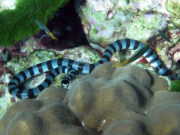
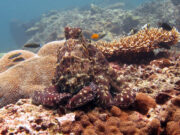
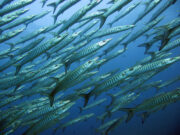
Known for their dramatic underwater landscapes and rich marine biodiversity, these sites are popular among divers of all skill levels. Koh Bida Nok, the larger of the two, features steep walls, caves, and swim-throughs, providing a dynamic diving experience.
The Bida islands are also great for scuba courses, including the open water course, the advanced course, and the rescue diver course.
With their stunning coral formations and diverse marine life, Koh Bida Nok and Koh Bida Nai offer unforgettable diving adventures, and are just 35 - 40 minutes from Koh Lanta.
Koh Bida Marine Life
Amazing Underwater Creatures
The waters around Koh Bida Nok and Koh Bida Nai are teeming with marine life, thanks to the nutrient-rich currents that flow through the area. Divers can expect to encounter a wide variety of species, from vibrant coral reefs to large pelagic fish.
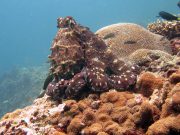
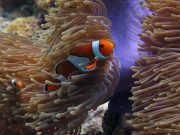
Find out more from the Thailand Department of National Parks on the Mu Koh Phi Phi Marine National Park.
Coral Reefs
Both islands boast healthy coral reefs, with a mix of hard and soft corals. These reefs provide a habitat for numerous small fish species, crustaceans, and other invertebrates. Commonly seen coral species include staghorn, brain, and mushroom corals, as well as colorful giant sea fans and giant sponges.
Fish Species
The fish life around Koh Bida Nok and Koh Bida Nai is abundant and diverse. Divers frequently encounter huge schools of snappers, fusiliers, and barracudas.
The area is also home to various species of angelfish, butterflyfish, and parrotfish, with boxfish, porcupinefish, trumpetfish, scorpionfish and lionfish also regularly spotted at the Bida Islands.
Sharks @ Koh Bida
Additionally, divers might spot larger species such as blacktip reef sharks which are frequently spotted here, possibly leopard sharks resting in the sand, and even the occasional whale shark cruising past.
Other Marine Life
Beyond fish, the dive sites around these islands are known for sightings of other marine creatures. Hawksbill turtles are commonly seen grazing on bubble corals, while cuttlefish, octopuses, and moray eels can be found hiding among the rocks and corals.
Reef squid, sea snakes, sea stars, giant clams, and many other marine species are also found at the Bida islands, including a large variety of nudibranchs and other colorful sea slugs, which are a favorite among macro photographers.
Koh Bida Nok
Diving Koh Bida Nok from Koh Lanta
Koh Bida Nok, the larger of the two islands, is situated approximately 1.5 kilometres south of Phi Phi Ley. The island is characterised by its rugged limestone cliffs that rise dramatically from the sea, creating a stunning landscape both above and below the water. The underwater topography features steep walls, swim-throughs, and rocky outcrops, providing a diverse range of habitats for marine life.

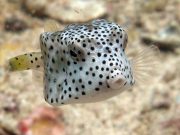
The northern part of this limestone island drops down to around 32m - 35m, offering great wall diving on both sides of the island. As you move further south, the reef becomes more shallow, eventually finishing in a small lagoon at the southern tip of Koh Bida Nok.
Bida Nok: West Wall
One of the most popular dive sites at Koh Bida Nok is the West Wall. This site features a steep drop-off that descends to around 30 metres, ending in a long finger reef that stretches out from the south west of the island.
The wall is covered in vibrant corals and attracts a variety of marine life, including schools of trevallies, barracudas, and reef sharks. A highlight of this wall are the often huge schools of snapper, where you can lose sight of the reef and your buddy.


When the visibility is good, the deeper, west side of Bida Nok is easily the best dive site around Phi Phi, with some world-class areas of coral and spectacular marine life. The depth and currents along some parts of the wall here make it suitable for more experienced divers.
There is also a long cave on the west wall of Koh Bida Nok, however we strongly recommend that you do not enter this narrow passage without the proper training in cave diving techniques, accompanied by experienced professionals.
Bida Nok: South Bay
The South Bay of Bida Nok offers a more sheltered diving experience, with depths ranging from 5 to 15 metres. This site is ideal for beginners and those looking for a relaxed dive.
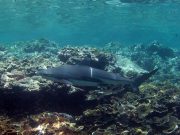

The sandy bottom is interspersed with coral bommies, home to an array of reef fish, moray eels, anemones, urchins, sea stars, mantis shrimp, and sometimes blue spotted stingrays or possibly even a leopard shark.
It’s in the shallow part of the bay that we’re most likely to see black tip reef sharks hunting among the corals and rocks. Crocodile needlefish patrol the shallows.
Bida Nok: Finger Reef
The south bay leads to a wide sandy slope, littered with corals, anemones, blue spotted stingrays, cuttlefish, mantis shrimp, sea stars and more.
On the west side of the bay is The Finger, a large coral encrusted ridge which is home to a wide variety of corals, gorgonian sea fans, scorpionfish, schools of Big-eye Snapper and many species which are not often seen elsewhere.
The finger drops down to 20+ metres and care should be taken in stronger currents.
Bida Nok: Shark Plateau
There is a shallow plateau along the east side of Bida Nok, where black tip reef sharks are often found cruising among the rocks and soft corals.
The plateau is mostly in the 3 - 5 metre range, then sloping away to 15 - 20 metres, with many coral formations and bommies stretching out into the deeper areas. Large schools of snapper and fusiliers can be found here.
At the end of the plateau you will find an overhang, after which the dive site slopes become steeper as you approach the deeper north wall.
Bida Nok: The Ridge to Bida Nai
As you come to the north east side of Binda Nok, the coral bommies stretch out into the blue, and a shallow sandy ridge connects Bida Nok to Bida Nai.
The ridge is roughly 16 m deep, and it only takes a couple of minutes to reach Bida Nai. Along the ridge you will find lots of mushroom corals, and occasionally stingrays.
Bida Nok: Dive Site Guide
- NameKoh Bida Nok
- Visibility10m - 25m +
- Level of DivingAll Levels
- SnorkelingYes
- Depth1m - 20m +
- CurrentsMild to Medium
- Journey Time35 - 45 mins

Book online to save 10% on dive trips and scuba courses on Koh Lanta.
Koh Bida Nai
Diving Koh Bida Nai from Koh Lanta
Lying just to the north of Koh Bida Nok is the little sister, Koh Bida Nai. Another favourite of divers visiting the area, Koh Bida Nai is a limestone cliff islet with similar topography to its larger neighbour and hosting equally diverse marine life.
While it shares similar geological characteristics to Bida Nok, including limestone cliffs and underwater formations, Bida Nai is known for its more sheltered bays and shallower dive sites, making it a preferred spot for beginner level divers.
Bida Nai: Anemone Bay
The anemone lagoon to the east of Bida Nai is a shallow, sheltered dive site perfect for novice divers and snorkelers. With depths of up to 15 metres, the shallows are home to thousands of anemones and anemonefish.
This area is usually protected from currents and is often blessed with good visibility, providing some really nice snorkelling.
Heading deeper, divers will find the sandy bottom and scattered coral formations. The calm conditions and clear waters provide excellent visibility, making it easy to spot the numerous fish species and invertebrates that inhabit the area.
Bida Nai : Swim Through & Fantasy Reef
Just south of Anemone Bay, divers will find a hidden swim-through created by a huge slice of fallen rock many thousands of years ago. T, this large gap in the rock is not immediately obvious unless you knew it was there.
Often filled with thousands of tiny glass fish that disperse as you begin your swim-through, keep a close eye on the rock walls for colourful nudibranchs and take care with your buoyancy as scorpion fish may also be found on the bottom.
Exiting the swim though and heading towards the south east of Bida Nai brings divers to Fantasy Reef, covered in barrel sponges, whip corals, gorgonian sea fans and a huge variety of marine life. Schools of jackfish, barracuda, and trevally are often found hunting on bait balls of younger fish above the reef.
Bida Nai: Swim Through Garden
After Fantasy Reef, divers can return to the main part of Bida Nai, following a steep rocky reef area up into the west side of the island.
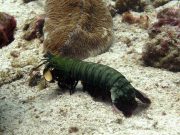
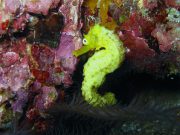
Here divers will find several very large rock formations with several swim-throughs and a wide sloping coral reef which continues to the north west of Bida Nai where it becomes a wall around the top of the island.
The large gently sloping reef starts around 3 metres and descends to 20 metres. The abundance of small fish and healthy corals attracts black tip reef sharks, making it a must-do site for divers.
Bida Nai : North Wall
To the north of Bida Nai the sloping reef becomes steeper, eventually giving way to a near-vertical wall which continues round the entire north part of the island, connecting back to Anemone Bay in the east.
As the slope becomes steeper, there are still plenty of corals and abundant marine life in the rocky areas at the base of the slope, with depths ranging from 15 - 20 m+.
The wall is covered in anemones, soft corals, sea fans, hard corals and sponges, and here we can hope to find many different types of nudibranchs, along with boxfish, pufferfish, masked porcupine fish, morays eels and sea snakes.
Bida Nai: Dive Site Guide
- NameKoh Bida Nai
- Visibility10m - 25m +
- Level of DivingAll Levels
- SnorkelingYes
- Depth1m - 30m +
- CurrentsMild to Medium
- Journey Time35 - 45 mins
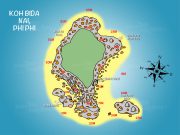
Book online to save 10% on dive trips and scuba courses on Koh Lanta.
Koh Bida Diving Price
Koh Lanta Dive Trips
Fun Diving price at Koh Bida is ฿3,150 for 2 dives. Diving price includes dive guide, free equipment rental, lunch & soft drinks on the boat when booked online in advance.
- 2 Dives
- FREE Equipment Rental
- Dive Guide
- Lunch & Soft Drinks
- 2 Dives
- FREE Equipment Rental
- Dive Guide
- Lunch & Soft Drinks
- You must be certified minimum SSI/PADI Open Water Diver, CMAS 1 Star Diver, BSAC Ocean Diver, or equivalent.
- Does not include Marine Park Diving Fee: Thai ฿240, Foreigner ฿600, per day.
See a complete list of all our Koh Lanta Diving Prices.
Book online to save 10% on dive trips and scuba courses on Koh Lanta.
Coral Reef Conservation
Protecting marine life at the Bida Islands
the Bida Islands are part of the Hat Noppharat Thara-Mu Ko Phi Phi National Park, a marine protected area. This status helps preserve the underwater ecosystem at the Bida Islands, and ensures sustainable tourism practices.
Divers visiting the Bida Islands are encouraged to follow guidelines that minimise their impact on the environment.
Responsible Diving Practices
To protect the delicate marine environment, divers are urged to follow responsible diving practices, including:
- Avoid touching or disturbing marine life while diving at the Bida Islands: Many marine organisms are delicate and can be harmed by human contact.
- Practice good buoyancy control while diving at the Bida Islands: Maintaining proper buoyancy helps prevent accidental damage to corals and other marine life.
- Do not collect souvenirs from the Bida Islands: Removing shells, corals, or other marine life from the sea is illegal and harmful to the ecosystem.
- Dispose of waste properly: Do not throw any rubbish or food into the sea, especially at the dive site. Throwing food into the water at a coral reef interferes with the delicate marine eco-system.
- Use Reef Safe Sun Block: Ensure your sunscreen is Reef Safe and does not harm the corals and marine life at the Bida Islands.
Koh Lanta Dive Sites
Some of Thailand's Best Diving
Bida Nok & Bida Nai are some of the best dive sites in Thailand, and can be easily dived from Koh Lanta by speedboat along with many of Thailand's other top dive sites:
- Lanta Marine Park
- Koh Haa Islands
- Koh Rok Islands
- Hin Daeng & Hin Muang
- Hin Musang Wildlife Reserve
- Shark Point & Anemone Reef
- Phi Phi Marine Park
- Bida Nok & Bida Nai
- Hin Bida
- Koh Phi Phi
- HTMS Kledkaeo Wreck
- Hin Klai
Find out more at the Thai Department of National Parks.
Our Dive Trip Schedule
Lanta Dive trips from 15 Oct - 15 May
Our dive trips depart Koh Lanta in the morning every day during high season from the south end of Long Beach, normally returning around 1:30 - 2pm.
| Week Day | Boat 1 | Boat 2 |
| Monday | Koh Bida / Phi Phi | Koh Bida / Phi Phi |
| Tuesday | Koh Haa Islands | Hin Daeng & Hin Muang |
| Wednesday | Koh Bida / Phi Phi | Koh Bida / Phi Phi |
| Thursday | Koh Haa Islands | Koh Haa Islands |
| Friday | Koh Haa Islands | Hin Daeng & Hin Muang |
| Saturday | Koh Bida / Phi Phi | Koh Bida / Phi Phi |
| Sunday | Koh Haa Islands | Koh Haa Islands |
- All trips are 2 dives a day
- Trips depart from the beach at our dive shop @ Lanta Castaway Beach Resort
- Trips Depart 8/9am, return 2pm
- Dive & Relax is open from Oct 15 - May 15.
- E-mail us info@diveandrelax.com in advance with any questions, or to make a booking.
We may schedule a Shark Point & Anemone Reef dive trip or a KledKaeo Wreck & Hin Klai dive trip upon request. A minimum of 5 divers are required for these trips, please let us know if you are interested.
We love to dive as much as possible during the high season, however all our dive trips depend on the weather, sea conditions, currents and minimum numbers and may be subject to change at short notice.
For more information on our weather and climate, check out the best time to visit Koh Lanta.
Book online to save 10% on dive trips and scuba courses on Koh Lanta.

